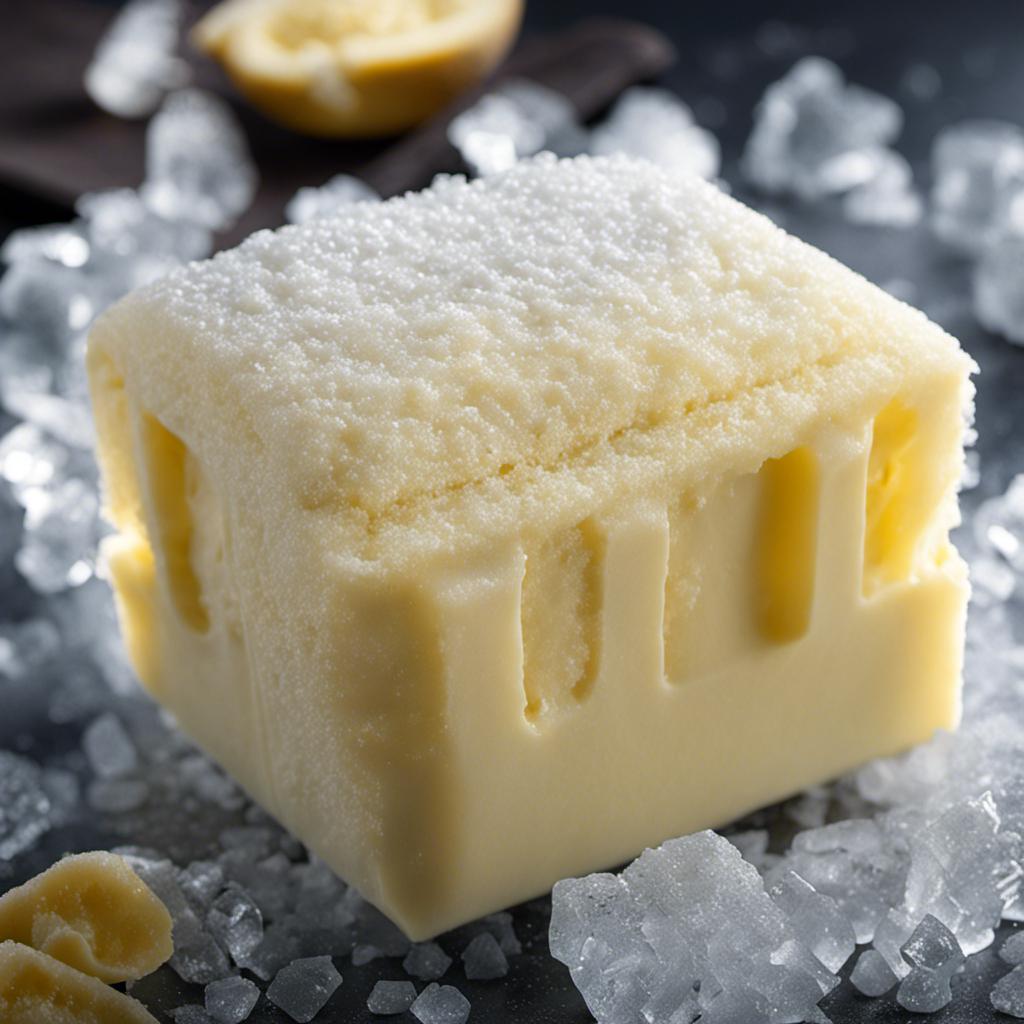Deciding whether to refrigerate butter depends on how quickly you’ll use it and your storage preferences. If you want soft, spreadable butter for daily use and keep it in a cool, dark place, storing it at room temperature in an airtight container works well for a few days. But for longer storage, refrigeration is safer to prevent spoilage and rancidity. If you’d like to find out more about ideal butter storage tips, continue exploring the options.
Key Takeaways
- Store small, frequently used amounts at room temperature in a covered dish for convenience, but only for a few days.
- Refrigerate butter for long-term storage to prevent rancidity and maintain freshness, especially in warm or humid environments.
- Use airtight packaging—foil, resealable bags, or containers—to extend shelf life and prevent oxidation regardless of storage method.
- Keep butter in a cool, dark place if stored at room temperature, and avoid exposure to light and heat to reduce spoilage risk.
- For artisanal or natural butter, refrigeration is recommended to slow oxidation and preserve quality over time.
Choosing the Right Storage Method

Deciding whether to refrigerate or leave butter out can be confusing, but understanding how storage affects its freshness and flavor makes the choice easier. Butter’s shelf stability depends largely on how you store it and the packaging choices you make. When you keep butter at room temperature, it remains soft and easy to spread, which is convenient for daily use. However, this flexibility comes with some risks. Butter left out for extended periods can become rancid faster, especially in warm or humid environments. The key to maximizing shelf stability while maintaining quality is to consider how airtight packaging can protect the butter from air and light, which accelerate spoilage.
If you prefer butter readily available for spreading, you might choose to keep a small amount out in a covered dish. Just ensure it’s stored in a cool, dark place and consumed within a few days. For longer-term storage, refrigeration is your best option. When butter is stored in the fridge, its shelf life extends considerably, often up to several months. Cold temperatures slow down the oxidation process, which causes rancidity, and help preserve flavor and freshness. Proper packaging choices are essential here; wrapping butter tightly in foil or placing it in an airtight container prevents it from absorbing odors from other foods and reduces exposure to air, which can lead to spoilage.
You should also consider the type of butter you buy. Commercially packaged butter often comes in foil or paper wraps that are designed to keep out light and air, enhancing shelf stability. If you purchase butter in bulk or in larger blocks, transferring portions into airtight containers or resealable bags can help extend its freshness once opened. Grass-fed or artisanal butters, which may contain more natural fats, benefit from careful packaging to limit oxidation, whether stored in the fridge or at room temperature. Additionally, understanding how storage conditions influence butter’s shelf life can help you make more informed choices.
In the end, your choice hinges on your usage habits and environment. If you use butter frequently and prefer it soft, keeping a small amount at room temperature with proper packaging choices is fine, but only for a few days. For longer storage, refrigeration with airtight wrapping is safer, preserving quality and preventing spoilage. Recognizing how packaging choices influence shelf stability helps you make smarter decisions, ensuring your butter stays fresh and delicious whenever you need it.
Frequently Asked Questions
Does Butter Last Longer at Room Temperature or in the Fridge?
You might wonder whether butter lasts longer at room temperature or in the fridge. At room temperature, butter stays soft, making it easier to spread, but its texture can spoil faster due to the lower melting point. Refrigeration slows bacterial growth, preserving butter longer, but it becomes harder and less spreadable. Ultimately, if you plan to use it quickly, room temperature is fine; for longer storage, the fridge is better.
Can I Freeze Butter for Extended Storage?
Yes, you can freeze butter for extended preservation using effective freezing techniques. Freezing helps maintain butter’s freshness and quality longer. Wrap it tightly in foil or plastic wrap, then place it in an airtight container or freezer bag. This prevents freezer burn and preserves flavor. When you need it, thaw in the fridge. Proper freezing techniques are essential for ideal butter preservation, ensuring you always have some on hand without compromising quality.
How Does Butter’S Flavor Change When Stored at Different Temperatures?
Imagine smooth butter melting softly on warm toast—its flavor bright and rich. When you store butter at different temperatures, you’ll notice subtle changes in its butter flavor. Cooler temperatures preserve its fresh, creamy taste, while warmer ones can cause it to develop a slightly sour or stale flavor over time. Temperature effects influence aroma and texture, so storing your butter properly keeps its flavor pure and delightful.
Is It Safe to Leave Butter Out Overnight?
You might wonder if it’s safe to leave butter out overnight. Generally, butter’s shelf life at room temperature is safe for up to two days, but it depends on your climate. If you keep it covered and in a cool, dark spot, it’s usually safe. Just remember, extended exposure can affect taste and texture, so for longer storage, refrigeration is best for maintaining freshness and safety.
What Are the Signs of Spoiled Butter Regardless of Storage Method?
When checking for spoiled butter, look for a spoiled smell, which indicates it’s gone bad, and mold growth on the surface, which is a clear sign to discard it. Even if it looks fine, a sour or rancid odor suggests spoilage. Always inspect the texture; if it feels slimy or sticky, it’s time to throw it away. Trust your senses—smell, sight, and touch—to determine if butter is still good.
Conclusion
Ultimately, your choice to refrigerate or not is like tending a delicate garden—carefully balancing preservation with natural warmth. When you decide to store butter in the fridge, you’re shielding it from the chaos of the outside world, ensuring longevity. Leaving it out invites a gentle, sunlit shelf life, embracing freshness and ease. Whichever path you choose, trust your instincts—your kitchen is your sanctuary, and every decision nurtures the harmony of your culinary landscape.









